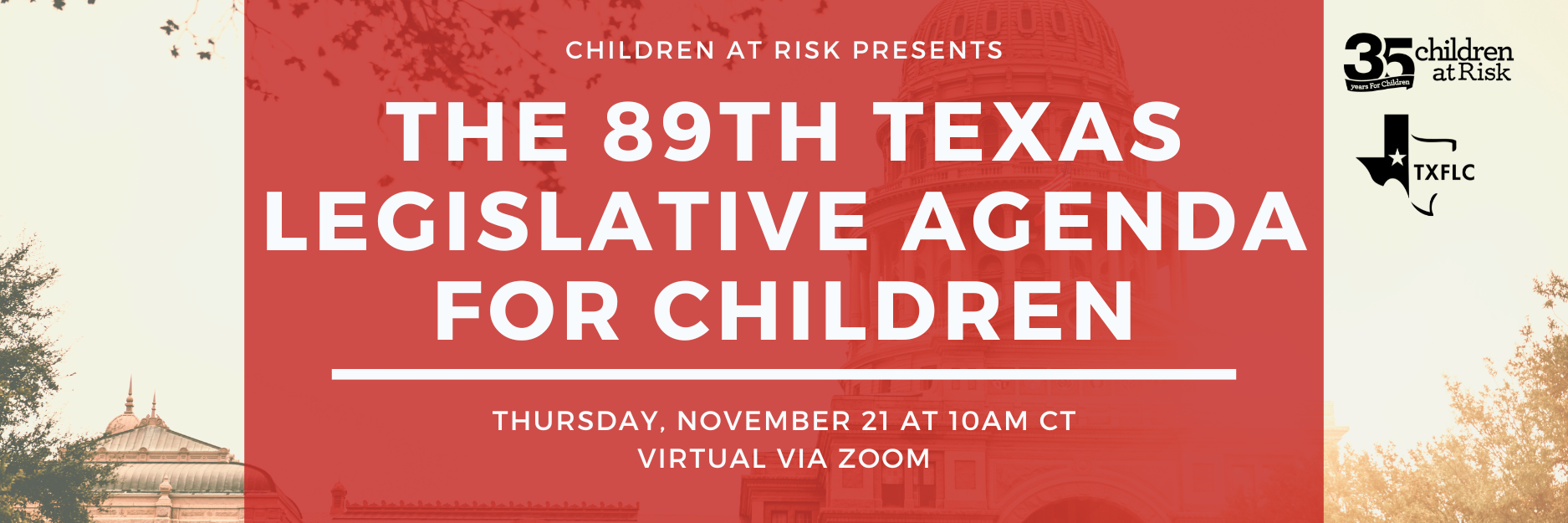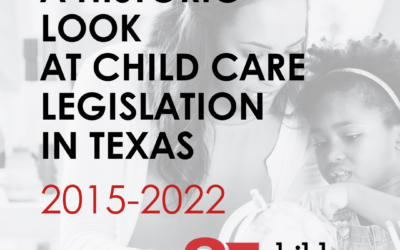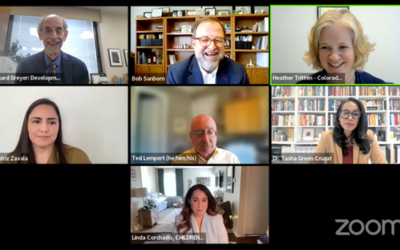
This post was written by Briauna Derry, Director of Media Activism, CHILDREN AT RISK.
On November 21, CHILDREN AT RISK, in partnership with the Texas Family Leadership Council, hosted the 89th Texas Legislative Agenda for Children Summit, bringing together experts, advocates, and policymakers to set priorities for Texas children and families, while unveiling CHILDREN AT RISK’s Policy Agenda for the 89th Texas Legislative Session in 2025.
The summit opened with powerful remarks from Dr. Bob Sanborn, President and CEO of CHILDREN AT RISK, who highlighted the urgency of addressing child poverty and inequities through unified action. Mandi Sheridan-Kimball, Vice President and Director of Government Affairs, followed by laying the groundwork for the day’s discussions, emphasizing the legislative priorities that will guide our advocacy efforts in the months ahead.
“We have a great amount of kids in our state, and that comes with a great responsibility to take care of them and ensure they have access to quality, reliable child care,” said Kofron. “Families can’t afford to pay any more, and providers can’t afford to pay any less.”
Throughout the day, leading experts presented thought-provoking insights across key policy areas:
Caroline Roberts emphasized the critical importance of reconnecting Texas youth to education and the workforce, drawing attention to the state’s higher-than-average rate of disconnected youth. “These young people are essential to the future of our workforce and economy,” she noted, urging collaboration to foster long-term success.
Kim Kofron addressed the challenges surrounding early childhood education, particularly the steep costs of child care that burden many families. “Most families spend 10-50% of their income on infant and toddler care, far above the federal recommendation of 7%,” she explained. Kofron also highlighted progress in the Texas Rising Star program and called for continued investments to strengthen early education.
Health policy experts Clayton Travis and Jamie Olson spotlighted the intersection of health and child well-being, from the increase in child hunger during summer months to the role of organizations in preventing infectious diseases. Their insights underscored the need for coordinated efforts to support children’s physical and mental health.
Jonathan Feinstein discussed the importance of equitable resource allocation in K-12 education, emphasizing the significant costs associated with teacher turnover and the urgent need for a strong, well-supported teaching workforce.
Linda Corchado shared an inspiring perspective on how schools and communities are collaborating to support emergent bilingual students and children of immigrants. “When schools work hand-in-hand with refugee groups, they create a powerful blueprint for addressing challenges and building supportive networks,” she shared.
The summit also showcased the critical role of private sector engagement in advancing child-centered policies. Moderated by Donald Bowers, Vice President of the Federal Reserve Bank of Dallas, the panel featured insights from Chris Wallace, Ed Wolff, and Doe Florsheim. Discussions focused on education, infrastructure, and housing affordability, with a shared commitment to creating equitable opportunities for all children. Wolff articulated it best: “Ensuring equitable education resources and early intervention sets children up for long-term success.”
The event concluded with a stirring call to action from Jason Sabo of Frontera Strategy. He urged attendees to remain steadfast in their advocacy, emphasizing that the ideas and collaborations fostered during the summit would drive meaningful change for Texas children and families.
The 89th Texas Legislative Agenda for Children underscored the power of unified advocacy and collective action. As we approach the 89th Texas Legislative Session, the partnerships and ideas formed during this event will serve as a powerful catalyst for progress. Together, we can create a Texas where every child has the support, resources, and opportunities they deserve. This is not the end of our work—it is just the beginning of a shared journey toward a brighter, more equitable future for all Texas children and families.
WATCH THE RECORDING
READ MORE FROM C@R
Advocates Convene in Support of New DACA & Parole in Place Executive Orders on Immigration
Advocates Convene in Support of Recent Executive Orders on Immigration Texas advocates applaud federal efforts to stabilize families and empower economic prosperity for undocumented spouses and Dreamers. Media Contact: Rashena Flagg, 713.301.4577 CHILDREN AT...
2024 Texas Tour | Child Care & Early Childhood
Written by Jacob Westjohn, Program Coordinator, C@R The Children At Risk team is incredibly grateful to all of the community members who shared their perspectives and expertise with us during the Texas Tour. These events are a valuable opportunity to discuss the needs...
Transparency, Quality, Efficiency: A historic look at child care legislation in Texas
Governor Greg Abbott, Lieutenant Governor Dan Patrick and the Texas Legislature have worked hard for years to improve child care for working parents. Due to smart bipartisan legislation and gubernatorial action in the past decade, Texas now has a more accountable and...
Subsidized Child Care System in Texas
Because money is often a critical barrier to accessing child care, Texas gives working families subsidies that can help them pay for child care. Where does the money for child care subsidies come from, where does it go, and who is left out? Here's a quick primer:...
Access to Affordable High-Quality Child Care is Scarce
By Kim Kofron, Early Childhood Education, and Jenn Meier, Center for Social Measurement and Evaluation (Note: Data sources are all publicly available from the Texas Workforce Commission, TEA, and Family Service. This report uses data from October 1st, 2022-September...
National organizations gather to advocate for the protection of vulnerable immigrant children in the U.S.
Media Contact: Rashena Flagg, 713.301.4577 Two years since Texas leadership announced the state would transport migrants who had been released from federal custody to other states, Texas has transported over 102,000 migrants to New York, Chicago, Denver, Philadelphia,...



